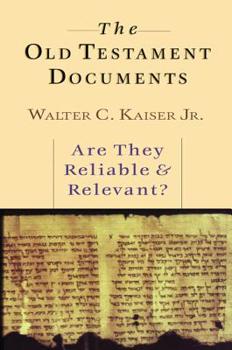The Old Testament Documents: Are They Reliable Relevant?
Select Format
Select Condition 
Book Overview
: Are They Reliable and Relevant? In this thought-provoking book Walter C. Kaiser Jr. makes the case that the Old Testament documents are both historically reliable and personally relevant. Also includes a helpful glossary of terms.
Format:Paperback
Language:English
ISBN:0830819754
ISBN13:9780830819751
Release Date:August 2001
Publisher:IVP Academic
Length:239 Pages
Weight:0.71 lbs.
Dimensions:0.7" x 5.5" x 8.2"
Customer Reviews
3 ratings
Good introduction
Published by Thriftbooks.com User , 19 years ago
Walter Kaiser believes that the Old Testament documents are both reliable and relevant for Christians today. While he does not try to "prove" the infallibility of the Old Testament scriptures, his argument in favor of their reliability and relevance is generally persuasive. Especially fascinating is some of the supporting archeological evidence, such as Baruch's bullae and investigations into the destruction of Sodom and Gomorrah. Kaiser also notes problems with the evidence when applicable; for example, the dating of the destruction of Sodom and Gomorrah and various "missing people." His argument is weakest in regards to Genesis 1-11 for several reasons. First he argues against those who hold that certain portions of early Genesis are "scientific impossible." But the main problem with these portions is not their scientific impossibility, but the lack of scientific evidence in favor of the biblical account. While this is problematic for the long lifespans and early iron-working, nowhere is it more devestating than for the universal flood story-a story that Kaiser overlooks completely! Moreover, while arguing in favor of Moses authorship for the Pentateuch, Kaiser dismisses the various "strands" that provide the support for the JEDP hypothesis. Kaiser does rightly expose some flimsy assumptions of the JEDP hypothesis; however, the existence of various strands in the text do not necessarily undermine support for Moses' authorship (for which Wright argues). It certainly seems plausible that Moses collected various written or oral traditions when writing and compiling the Pentateuch, and so a wholesale dismissal of the JEDP hypothesis might be hasty. Despite these flaws, this book remains a good introduction to the topic.
The Relevancy and Reliability of the Old Testament
Published by Thriftbooks.com User , 21 years ago
Kaisers work with the Old Testament Documents is an interesting read. I had the belief that the Old Testament documents were both reliable and relevent before I began to read this book, and after reading it my belief still stands. There are only two arguments that I would like to confront after reading Kaiser's work. The first thing that I dislike is how Kaiser skims over some topics of debait and basically just says that they are historically accurate because they are found in historical documents from more than one source. This could easily be construed by simple "word of mouth" or lack of an eye witness. A rumor or tale could be believable and convincing and yet not true or precise. The second thing that I noticed about this book, is the fact there is very little evidence to go by in regards to the Old Testament, and Kaiser does not thoroughly discuss this problem. Although further discussion of this topic might hurt Kaiser's points, it would only be fair to show how small the stack of evidence, even though convincing, really is. Overall, this book was very informative and serves as a great introduction to how the Old Testament can be both "reliable and relevant" today.
Good Introduction, But Needs Expansion In Some Areas.
Published by Thriftbooks.com User , 22 years ago
Most books dealing with the reliability of Biblical documents focus on their transmission history, and usually that of the New Testament, as we know more about it. How much less we know of the textual history of the Older Testament, however, is seen in that only 35 pages of this book are actually devoted to it! The rest of the work is filled out by discussions of whether or not the history and message recorded in those documents is reliable and relevant to today. These discussions are introductory and survey the field in a manner that seems to skate over some rather prickly issues, particularly in the areas where Kaiser argues for the reliability of the recorded history. Given that this work came out some six years after the first major public salvo from minimalist interpreters, who deny the historicity of the events Kaiser argues are historical, there should have been more interaction with them. Their views are becoming general public knowledge and should be interacted with. There also seems to be a tendency in the later sections on the reliability of the messages in the documents, to jump from the fact that something in the text is historically accurate to the view that the message is therefore reliable. The message of Ezekiel, for example, may or may not be reliable, but it isn't proven by the fact that other people at the same time also used bricks as writing materials. On the positive side, however, the discussion of the textual history is concise and informative, as is most of the book. There is also useful information on how many critical views of the text, which remain prevalent in the popular conscience and media, are actually either passe, dead, or under serious fire on the academic end. Over all, the book is worth reading as long as one keeps in mind its introductory survey nature and are willing to pursue the issues to greater depth via the footnotes. The book will give you a good foothold in and understanding of the field to make a solid start at it.






